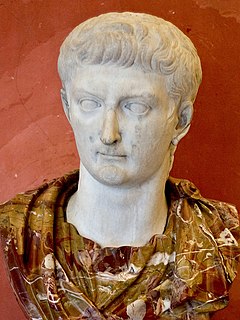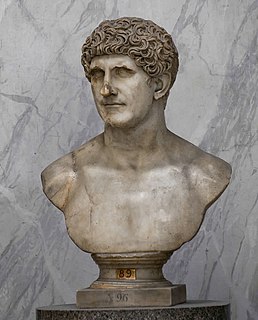See also
This article incorporates text from a publication now in the public domain : Chisholm, Hugh, ed. (1911). "Cestius, Lucius". Encyclopædia Britannica . Vol. 5 (11th ed.). Cambridge University Press. p. 768.
Lucius Cestius, surnamed Pius, Latin rhetorician, flourished during the reign of Augustus.
He was a native of Smyrna, a Greek by birth. According to Jerome, he was teaching Latin at Rome in the year 13 BC. He must have been living after AD 9, since, we are told that he taunted the son of Quinctilius Varus with his father's defeat in the Teutoburgian Forest (Seneca the Elder, Controv. i. 3, 10).
Cestius was a man of great ability, but vain, quarrelsome and sarcastic. Before he left Asia, he was invited to dinner by Cicero's son, then governor of the province. His host, being uncertain as to his identity, asked a slave who Cestius was; and on receiving the answer, "he is the man who said your father was illiterate," ordered him to be flogged (Seneca, Suasoriae, vii. 13).
As an orator in the schools Cestius enjoyed a great reputation, and was worshipped by his youthful pupils, one of whom imitated him so slavishly that he was nicknamed "my monkey" by his teacher (Seneca, Controv. ix. 3, 12). As a public orator, on the other hand, he was a failure. Although a Greek, he always used Latin in his declamations, and, although he was sometimes at a loss for Latin words, he never suffered from lack of ideas. Numerous specimens of his declamations will be found in the works of Seneca the rhetorician.
See the monograph De Lucio Cestio Pio, by FG Lindner (1858); J Brzoska in Pauly-Wissowa's Realencyclopädie, iii. 2 (1899); Teuffel-Schwabe, Hist. of Roman Lit. (Eng. tr.), 268, 6; M Schanz, Geschichte der römischen Litteratur, ii.
This article incorporates text from a publication now in the public domain : Chisholm, Hugh, ed. (1911). "Cestius, Lucius". Encyclopædia Britannica . Vol. 5 (11th ed.). Cambridge University Press. p. 768.

Lucius Annaeus Seneca the Younger, usually known as Seneca, was a Roman Stoic philosopher, statesman, dramatist, and, in one work, satirist, from the post-Augustan age of Latin literature.
Marcus Cornelius Fronto, best known as Fronto, was a Roman grammarian, rhetorician, and advocate. Of Berber origin, he was born at Cirta in Numidia. He was suffect consul for the nundinium of July-August 142 with Gaius Laberius Priscus as his colleague. Emperor Antoninus Pius appointed him tutor to his adopted sons and future emperors, Marcus Aurelius and Lucius Verus.

Marcus Fabius Quintilianus was a Roman educator and rhetorician from Hispania, widely referred to in medieval schools of rhetoric and in Renaissance writing. In English translation, he is usually referred to as Quintilian, although the alternate spellings of Quintillian and Quinctilian are occasionally seen, the latter in older texts.

Classical Latin is the form of Literary Latin recognized as a literary standard by writers of the late Roman Republic and early Roman Empire. It was used from 75 BC to the 3rd century AD, when it developed into Late Latin. In some later periods, it was regarded as good or proper Latin, with following versions viewed as debased, degenerate, or corrupted. The word Latin is now understood by default to mean "Classical Latin"; for example, modern Latin textbooks almost exclusively teach Classical Latin.
Lucius Annaeus Seneca the Elder, also known as Seneca the Rhetorician, was a Roman writer, born of a wealthy equestrian family of Corduba, Hispania. He wrote a collection of reminiscences about the Roman schools of rhetoric, six books of which are extant in a more or less complete state and five others in epitome only. His principal work, a history of Roman affairs from the beginning of the Civil Wars until the last years of his life, is almost entirely lost to posterity. Seneca lived through the reigns of three significant emperors; Augustus, Tiberius and Caligula. He was the father of Lucius Junius Gallio Annaeanus, best known as a Proconsul of Achaia; his second son was the dramatist and Stoic philosopher Seneca the Younger (Lucius), who was tutor of Nero, and his third son, Marcus Annaeus Mela, became the father of the poet Lucan.

The gens Claudia, sometimes written Clodia, was one of the most prominent patrician houses at ancient Rome. The gens traced its origin to the earliest days of the Roman Republic. The first of the Claudii to obtain the consulship was Appius Claudius Sabinus Regillensis, in 495 BC, and from that time its members frequently held the highest offices of the state, both under the Republic and in imperial times.
The gens Tullia was a family at ancient Rome, with both patrician and plebeian branches. The first of this gens to obtain the consulship was Manius Tullius Longus in 500 BC, but the most illustrious of the family was Marcus Tullius Cicero, the statesman, orator, and scholar of the first century BC. The earliest of the Tullii who appear in history were patrician, but all of the Tullii mentioned in later times were plebeian, and some of them were descended from freedmen. The English form Tully, often found in older works, especially in reference to Cicero, is now considered antiquated.

The gens Julia was one of the most ancient patrician families in ancient Rome. Members of the gens attained the highest dignities of the state in the earliest times of the Republic. The first of the family to obtain the consulship was Gaius Julius Iulus in 489 BC. The gens is perhaps best known, however, for Gaius Julius Caesar, the dictator and grand uncle of the emperor Augustus, through whom the name was passed to the so-called Julio-Claudian dynasty of the first century AD. The nomen Julius became very common in imperial times, as the descendants of persons enrolled as citizens under the early emperors began to make their mark in history.
Himerius was a Greek sophist and rhetorician. 24 of his orations have reached us complete, and fragments of 12 others survive.

Lucius Junius Gallio Annaeanus or Gallio was a Roman senator and brother of the famous writer Seneca. He is best known for dismissing an accusation brought against Paul the Apostle in Corinth.
Marcus Porcius Latro was a celebrated Roman rhetorician who is considered one of the founders of scholastic rhetoric.
The gens Annaea was a plebeian family at Rome during the first century BC, and the early centuries of the Empire. Members of this gens were distinguished for their love of literary pursuits. Several members of the family fell victim to the various plots and intrigues of the court of Nero, including the conspiracy of Gaius Calpurnius Piso.

The gens Antonia was a Roman family of great antiquity, with both patrician and plebeian branches. The first of the gens to achieve prominence was Titus Antonius Merenda, one of the second group of Decemviri called, in 450 BC, to help draft what became the Law of the Twelve Tables. The most prominent member of the gens was Marcus Antonius.
The gens Arellia was a plebeian family at Rome. Although of equestrian rank, this gens does not appear to have been particularly large or important, and is known primarily from three individuals.

The gens Maria was a plebeian family of Rome. Its most celebrated member was Gaius Marius, one of the greatest generals of antiquity, and seven times consul.
The gens Cestia was a plebeian family at ancient Rome during the later Republic, and in imperial times. The first member of the gens to obtain the consulship was Gaius Cestius Gallus in AD 35. The family's name is commemorated on two monuments, the Pons Cestius and the Pyramid of Cestius which survive into modern times.
The gens Hateria, occasionally Ateria, was a plebeian family at ancient Rome, known from the last century of the Republic and under the early Empire. The most distinguished of the Haterii was Quintus Haterius, a senator and rhetorician in the time of Augustus and Tiberius. He was consul suffectus in 5 BC.
The gens Magia was a plebeian family at ancient Rome. Members of this gens are first mentioned at the time of the Second Punic War. Although several of them performed useful service to the Roman state, none of the Magii ever held the consulship.
The gens Rubellia was a minor plebeian family at ancient Rome. Members of this gens are first mentioned in the time of Augustus, and they achieved prominence during the first century, when two of them obtained the consulship: Gaius Rubellius Blandus in AD 18, and Lucius Rubellius Geminus in AD 29.
Three main sets of works are attributed to Florus : Virgilius orator an poeta, an Epitome of Roman History and a collection of 14 short poems. As to whether these were composed by the same person, or set of people, is unclear, but the works are variously attributed to: